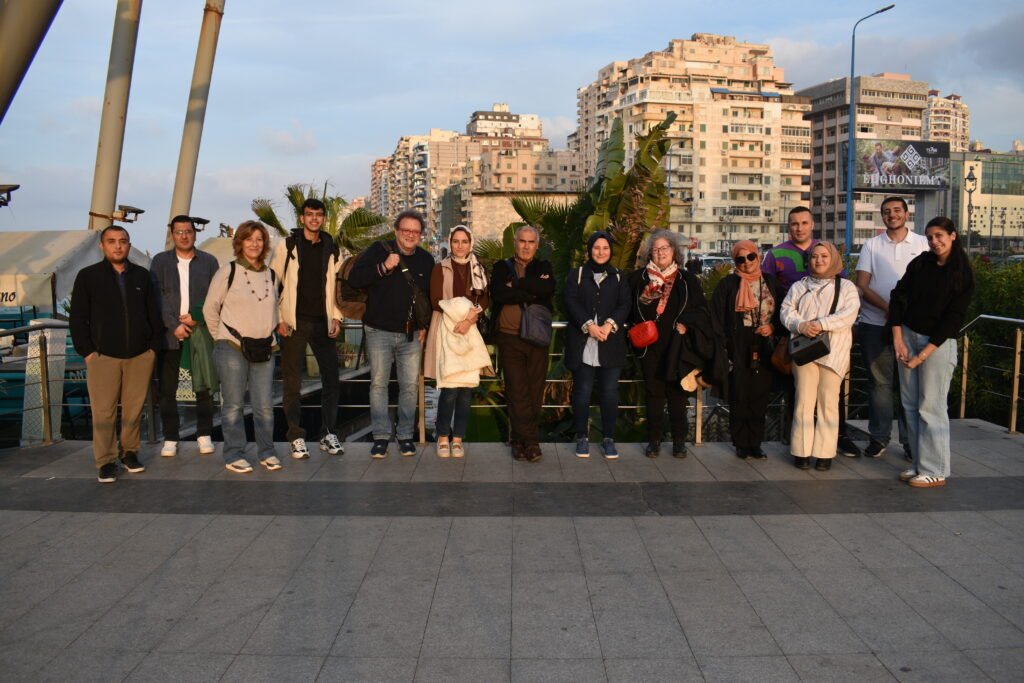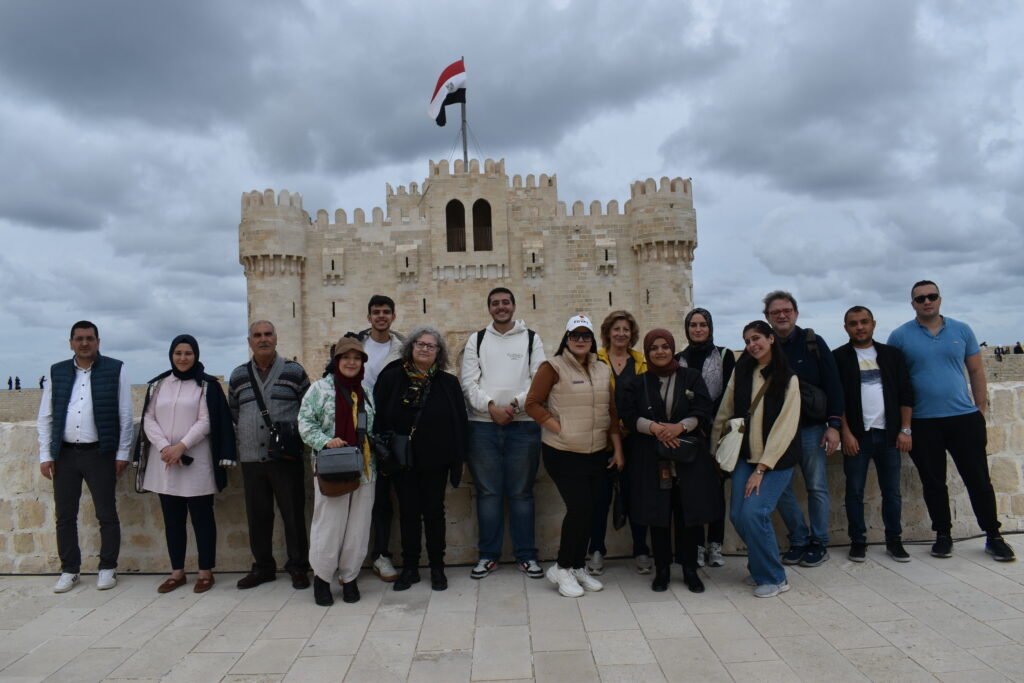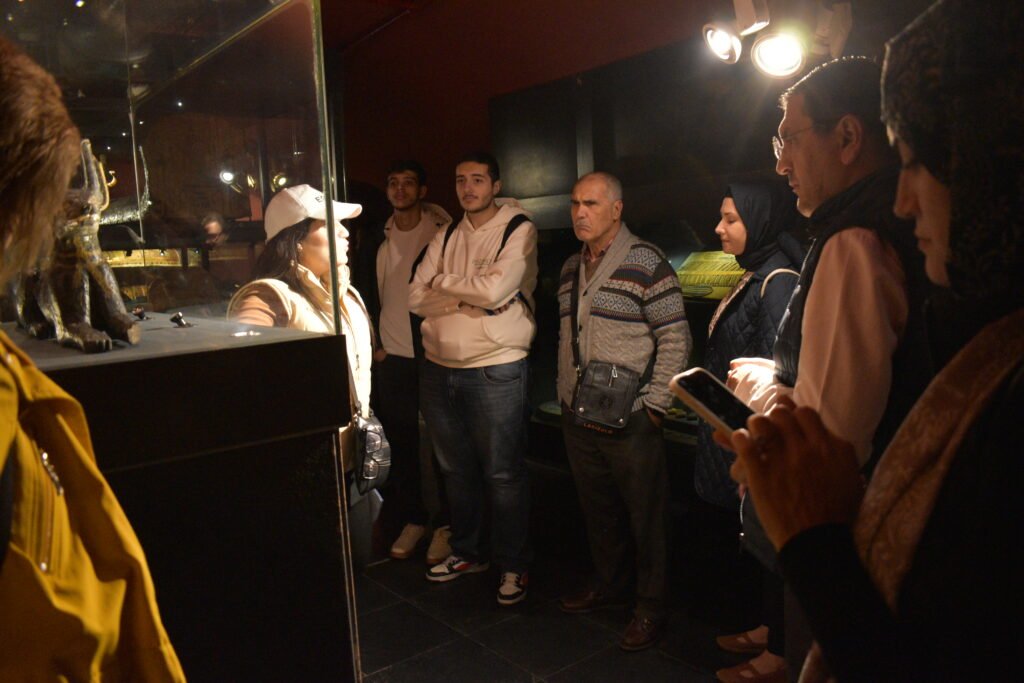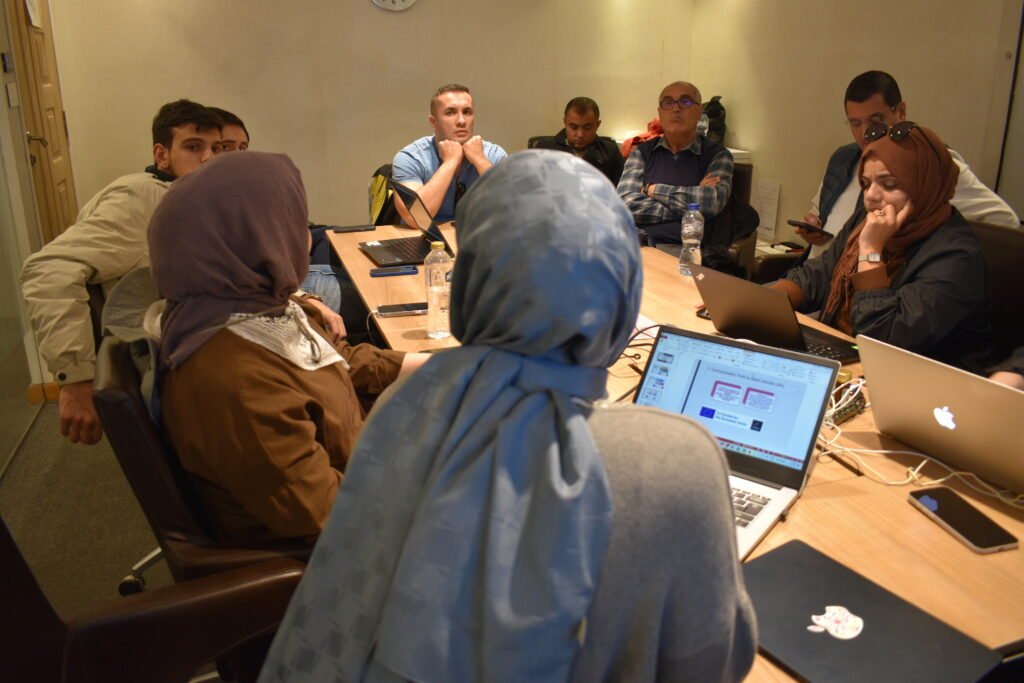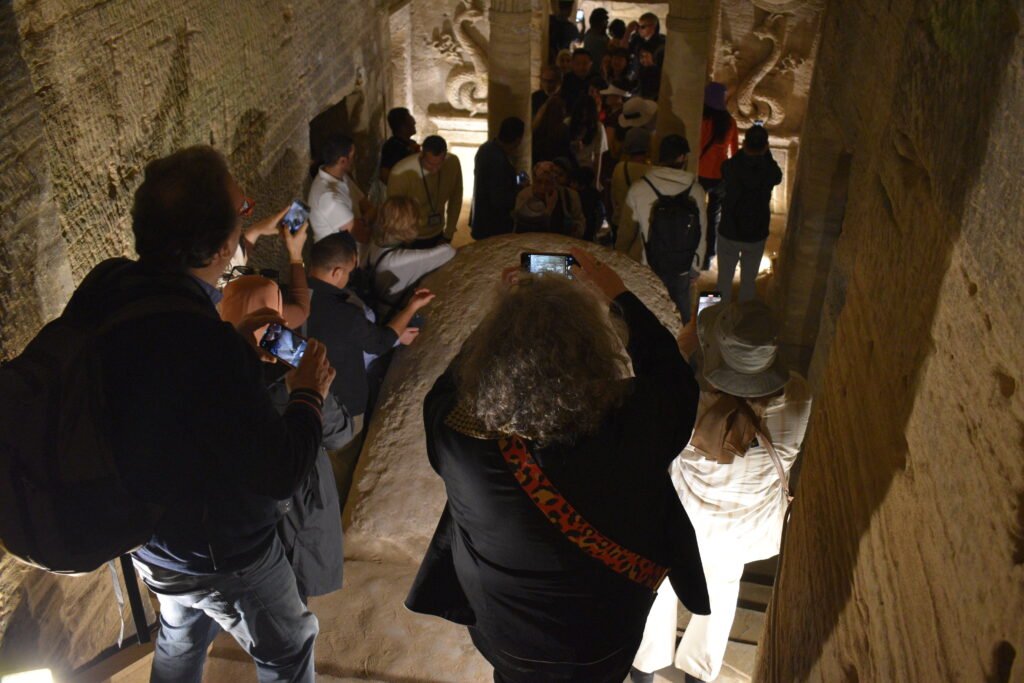Tourbine Project: Supporting Young People with Fewer Opportunities in Developing Entrepreneurial Mindsets and Digital Skills for (Self-)Employment through Community-Based Tourism
Introduction
The Tourbine project aims to support young people with fewer opportunities, specifically those who are not in employment, education, or training (NEET), in developing entrepreneurial mindsets and acquiring transversal key competences and digital skills. The project focuses on empowering these individuals to secure sustainable employment or create their own businesses within the community-based tourism sector.
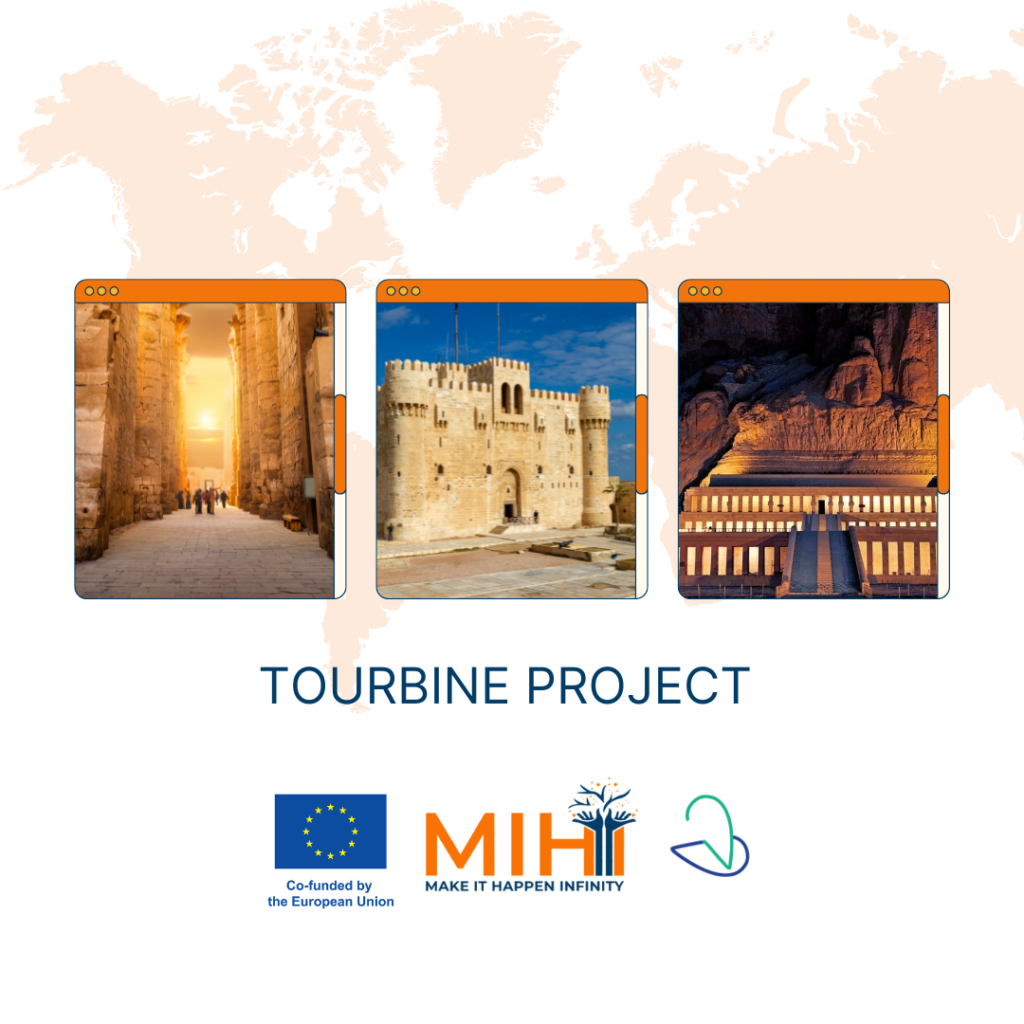
Activities
The project includes a series of activities designed to engage NEET communities and equip them with the necessary skills and resources for success. These activities include:
- Onsite stakeholder workshops
The project begins with four onsite stakeholder workshops that serve as a platform for mapping the current realities faced by NEET individuals. These workshops use recognized methodologies such as design thinking and liberating structures to guide participants in envisioning the desired change. - Defining integrated solutions
Based on insights gained from the stakeholder workshops, a set of integrated solutions is defined. These solutions aim to address identified challenges and provide NEET communities with new skills, skill recognition, and employment opportunities. The ecosystem as a whole is considered to generate value for the final user. - Skill development and employment opportunities
The integrated solutions developed during the workshops are implemented in six NEET communities. These communities benefit from skill development programs focused on transversal key competences and digital skills. By equipping individuals with these abilities, the project aims to enhance their employability and empower them to secure sustainable (self-)employment in the community-based tourism sector. - Cooperation and training practices
The Tourbine project introduces a new form of cooperation among multilevel stakeholders involved in community-based tourism. It embraces innovative training practices by leveraging ICT-based services and social media platforms. This approach facilitates knowledge-sharing, fosters collaboration, and improves the overall training experience for NEET individuals. - Mobile accessibility of tourism products and services
The workshops also highlight the benefits of mobile accessibility for tourism products and services. Participants are introduced to the advantages of using mobile technology to enhance the reach and impact of their offerings. By utilizing mobile platforms, NEET individuals can connect with a broader customer base and create innovative tourism experiences.
Impact and outcomes
Through the Tourbine project, six NEET communities benefit from the activities and methodologies implemented. These communities experience positive transformation by gaining new skills, receiving recognition for their competences, and accessing (self-)employment opportunities within the community-based tourism sector.
The project emphasizes entrepreneurial mindsets to equip young people with the ability to identify and seize opportunities in their local contexts. By fostering a spirit of entrepreneurship, the Tourbine project encourages creativity, innovation, and resourcefulness among NEET participants.
Developing transversal key competences ensures that participants possess diverse, transferable skills that enhance their employability in community-based tourism and other industries.
The integration of digital skills equips NEET participants with the tools and knowledge to navigate the digital world effectively. Proficiency in digital technologies is essential for personal and professional growth, and the Tourbine project ensures participants are better prepared to meet the demands of the modern job market.
Project goals
The primary goal of the Tourbine project is to identify and stimulate the review of relevant political measures within the framework of education policy. By understanding and evaluating existing development obstacles for business opportunities in the tourism sector, the project aims to contribute to the industry’s growth and success. It focuses on examining policies that impact education and their implications for creating favorable conditions for entrepreneurship and employment in the tourism sector.
Solutions
The Tourbine project defines a set of integrated solutions to benefit six NEET communities. These solutions help individuals acquire new skills, recognize existing skills, and create opportunities for (self-)employment. Through access to training programs and resources, the project empowers individuals with the tools and knowledge they need to succeed in the tourism industry.
The solutions include vocational training, mentorship programs, entrepreneurship support, and networking opportunities. These initiatives address the specific needs and challenges faced by NEET communities, fostering employability and economic prospects by developing entrepreneurial mindsets.
Report
A comprehensive report will be created based on the analysis of data collected from workshops conducted during the Tourbine project. The report will focus on skill sets identified in each workshop, providing insights into the specific needs of individuals in NEET communities. This analysis will guide policymakers and stakeholders in optimizing tourism offers and contributing to economic development.
The report will serve as a resource for policymakers, educators, and industry professionals, offering evidence-based recommendations to enhance education policy and address obstacles in the tourism sector. It will outline areas for improvement and encourage collaboration among stakeholders to create a more inclusive and sustainable tourism industry.
Conclusions
To meet the needs of visitors, tourists, citizens, and employees in the tourism industry, it is essential to initiate dialogue about resources, challenges, and opportunities. By discussing education policy, skills development, and entrepreneurship support, stakeholders can optimize tourism offerings and contribute to economic development.
The Tourbine project’s research and analysis will provide conclusions about the needs of stakeholders in the tourism industry. These findings will shape future policies and initiatives to address these needs effectively. By fostering collaboration among policymakers, educators, businesses, and communities, the project aims to support sustainable growth and prosperity in the tourism sector.
The first meeting: developing training methods and employment opportunities in Konya, Turkey
The Tourbine project meeting, held in Konya, Turkey, from May 1st to 3rd,2023 focused on revolutionizing the tourism industry by creating innovative training methods, mindsets, and skill sets for young people. The project aimed to provide unique value propositions and employment opportunities while identifying, transferring, and sharing best practices in the design and delivery of experience-based tourism. These efforts were designed to help employers recruit and retain talented individuals with the necessary skills and knowledge for the tourism sector.
Developing new training methods
A core objective of the Tourbine project was to develop innovative training methods tailored to young people entering the tourism industry. Recognizing that traditional education systems often fail to prepare students for real-world scenarios, the project meeting explored various approaches to enhance training programs, including:
- Experiential learning: Participants engaged in simulations, role-playing exercises, and site visits to gain hands-on experience in customer service, hospitality management, cultural awareness, and sustainable tourism practices.
- Interactive workshops: These sessions provided a platform for participants to actively engage with industry professionals and experts, discuss emerging trends, and address challenges in the tourism sector.
- Mentorship programs: Young people received guidance and support from seasoned professionals, fostering personal and professional growth.
- Industry partnerships: Collaborations with employers, educational institutions, and local communities ensured training programs aligned with market demands and equipped participants with relevant skills.
Creating unique value propositions
Tourbine emphasized the importance of young people developing unique value propositions to stand out in the competitive tourism industry. Strategies included:
- Specialization: Encouraging participants to focus on niches such as adventure tourism, ecotourism, or cultural tourism to position themselves as experts.
- Language skills: Highlighting the importance of learning multiple languages to communicate effectively with international visitors and demonstrate cultural competence.
- Digital literacy: Training participants in online marketing, social media management, data analysis, and other digital tools to adapt to technological advancements in the tourism sector.
Employment opportunities and good practices
The Tourbine project aimed to bridge the gap between education and employment by identifying, transferring, and sharing good practices within the tourism industry. Participants showcased innovative approaches to customer service, hospitality management, marketing, and sustainable tourism. These examples inspired young people and guided their development.
The project also facilitated knowledge transfer through workshops, seminars, and networking events, allowing participants to learn from experienced professionals and gain insights into current trends and challenges in the tourism sector.
Conclusion
The Tourbine project meeting in Konya, Turkey, marked a significant step in developing new training methods, skill sets, and mindsets for young people in the tourism industry. By promoting innovative approaches, unique value propositions, and knowledge sharing, the project aimed to enhance employment opportunities and empower young people to succeed in the dynamic world of tourism.
The multilevel actors workshop: exploring perspectives and ideas in the field of tourism
The multilevel actors workshop, held as part of the Tourbine project in Alexandria, Egypt, provided a platform for participants to engage in activities, discussions, and idea-sharing sessions focused on tourism. This workshop aimed to bring together diverse perspectives and foster innovative approaches in the field.
Workshop overview
The workshop brought together individuals from varied backgrounds, including students, professionals, and young people interested in tourism. Through interactive panel discussions and open dialogues, participants shared their perspectives, experiences, and ideas about community tourism. The event emphasized understanding tourism’s role in local communities and explored participants’ expectations and concerns on various themes.
Interactive panel discussion: community tourism
A key highlight of the workshop was the interactive panel discussion on “Community Tourism.” The panel featured young individuals at different stages of their lives, engaging in open dialogue with stakeholders. The discussion addressed:
- Perspectives on tourism: Participants shared their views on tourism’s impact on communities, the economy, and the environment, exploring its potential for sustainable development and cultural preservation.
- Experiences and insights: They discussed personal experiences with community tourism, including successes in empowering communities and challenges faced by locals.
- Expectations and concerns: Topics included managing overtourism, avoiding cultural commodification, promoting sustainability, and ensuring equitable distribution of benefits.
Activities and idea-sharing sessions
In addition to the panel discussion, the workshop included activities and sessions designed to foster collaboration and develop skills. Key areas included:
- Sustainable tourism practices: Participants explored ways to minimize tourism’s negative impacts while maximizing its positive contributions to local economies and environments.
- Skill development: Emphasis was placed on essential skills for tourism careers, such as communication, cultural sensitivity, entrepreneurship, and environmental stewardship.
- Collaboration and networking: Group projects, case studies, and problem-solving exercises encouraged participants to learn from one another’s experiences and build professional networks.
Conclusion
The multilevel actors workshop offered a space for participants to explore community tourism through interactive discussions and collaborative activities. By exchanging ideas and insights, they gained a deeper understanding of tourism’s role in communities and developed skills to foster sustainable practices. The workshop empowered individuals to pursue careers in tourism while promoting innovation and collaboration within the industry.
The Second Meeting: Driving Positive Change through Tourism
The second meeting of the Tourbine project took place in Chios, Greece, bringing together individuals and organizations dedicated to fostering positive change in tourism. This gathering created a platform for collaboration, idea-sharing, and skill enhancement to promote a sustainable and impactful tourism industry.
Key Highlights
1. Game Design Training
Participants underwent comprehensive training to design an explorative game aimed at showcasing Chios’s rich history and culture. The game will provide an engaging experience for tourists and locals, enhancing their connection to the region. Excitingly, the first trial of this game is scheduled for January 2024 to gather feedback for further development.
2. Long-Term Training Activity (LTTA) and Workshop
The meeting featured an LTTA, offering in-depth insights into sustainable tourism, community engagement, and management strategies. Practical workshops complemented this by fostering hands-on learning in marketing, stakeholder engagement, and sustainability.
3. Study Visit to Chios Heritage Sites
Participants explored Mesta and Pyrgi, two medieval villages, and visited cultural landmarks such as Nea Moni, a UNESCO-listed monastery. These visits provided firsthand insights into heritage tourism and preservation efforts.
Reviving Egypt’s Cultural Heritage: From Vision to Reality
As part of the Tourbine project, the initiative “Reviving Egypt’s Cultural Heritage into a Game” aims to create an engaging and educational gaming experience that showcases the wonders and history of ancient Egypt.
Objective and Vision
The game seeks to merge storytelling, interactivity, and historical immersion, allowing players to explore Egypt’s landmarks, architecture, and mythology. By combining entertainment and education, it promotes cultural awareness and appreciation of Egypt’s heritage.
Comprehensive Training Program
A four-day online training equipped participants with skills in game design, storytelling, and historical research. Collaborating with experts, participants gained the expertise to transform Egypt’s cultural heritage into a captivating game.
Recognition and Opportunities
Participants who completed the training received certificates acknowledging their efforts. Additionally, one outstanding designer will attend a prestigious meeting in Berlin, Germany, to showcase achievements and network with professionals in March 2024.
The Tourbine project exemplifies how gaming can bring history to life, blending education and entertainment to celebrate and preserve cultural heritage.
Game Development Progress: Milestones Achieved
The Tourbine project is making remarkable progress in developing a game that brings Egypt’s cultural heritage to life through an engaging and interactive experience. Here’s a look at the key milestones achieved so far:
1. Completion of Initial Framework and Concept Design
The foundational structure of the game is now in place. Participants have defined core gameplay mechanics, created a storyline inspired by ancient Egyptian culture, and identified significant historical elements to feature.
2. Integration of Cultural and Historical Research
Leveraging insights from training sessions, the game design incorporates Egypt’s architectural marvels, mythology, and aspects of daily life. This focus on authenticity ensures an experience that is both educational and captivating.
3. Collaborative Brainstorming Sessions
Participants have actively engaged in creative teamwork, bringing ideas to life through interactive quests and challenges. These collaborative sessions have laid the groundwork for a truly immersive gaming experience.
4. Prototyping and Testing Phase
The initial prototype is currently in development to evaluate gameplay mechanics and storytelling elements. This critical phase will refine the game and ensure a seamless, engaging experience for players.
With these milestones achieved, the project is steadily advancing toward its goal of blending education and entertainment to celebrate Egypt’s rich cultural heritage.
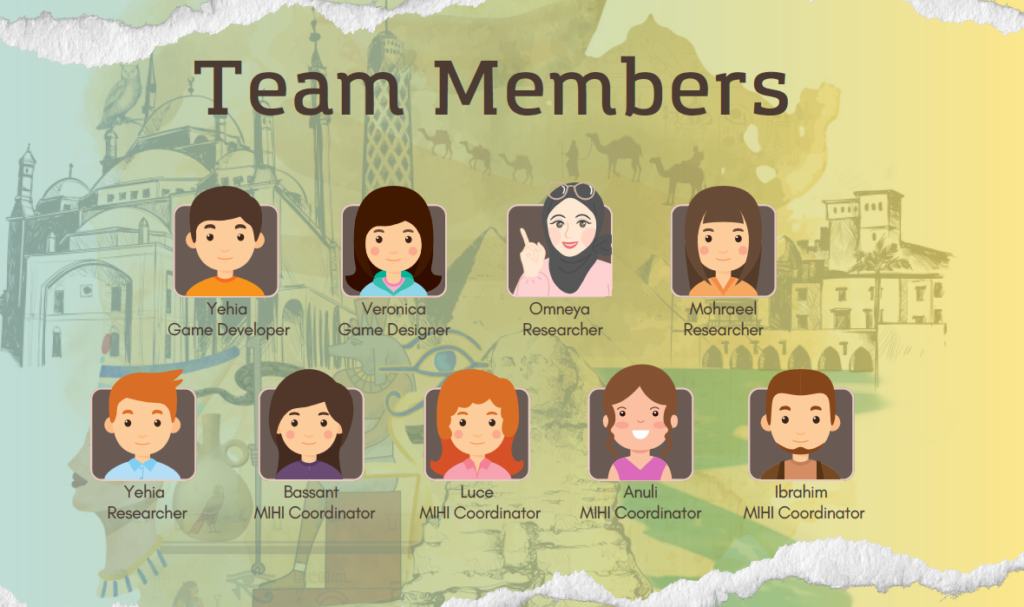
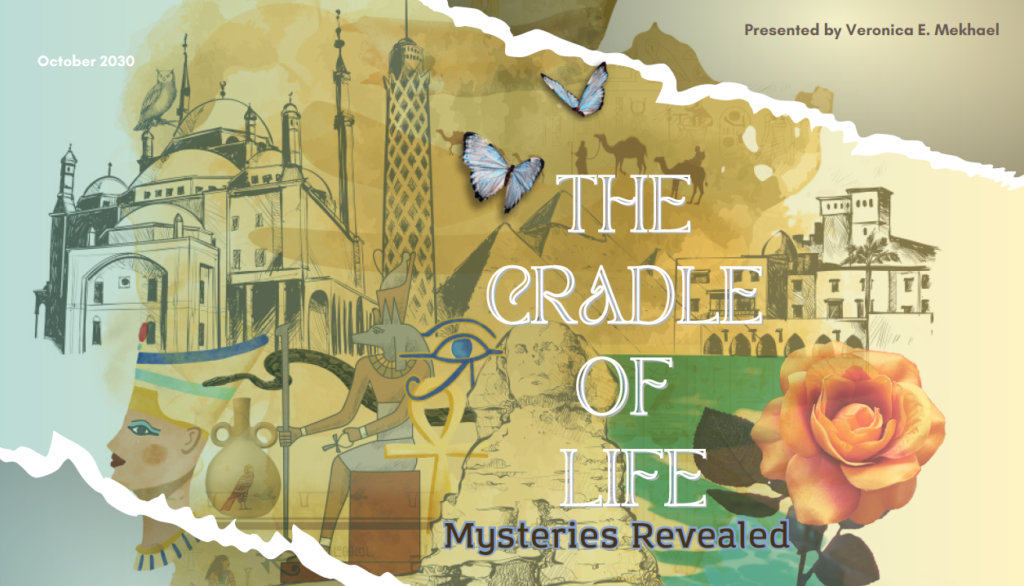
Exciting Milestone Ahead: Testing the Explorative Game
We are delighted to announce the upcoming trial of the explorative game, a significant step in our mission to create engaging, educational experiences that celebrate cultural heritage. This much-anticipated trial is scheduled for the end of January 2024 and will bring our vision to life while serving as a platform to refine the game before its official launch.
About the Game
Designed to immerse players in the rich history and traditions of our host regions, the game blends storytelling, interactive challenges, and historical exploration. It aims to captivate both tourists and locals, making learning about culture and heritage an enjoyable and memorable journey.
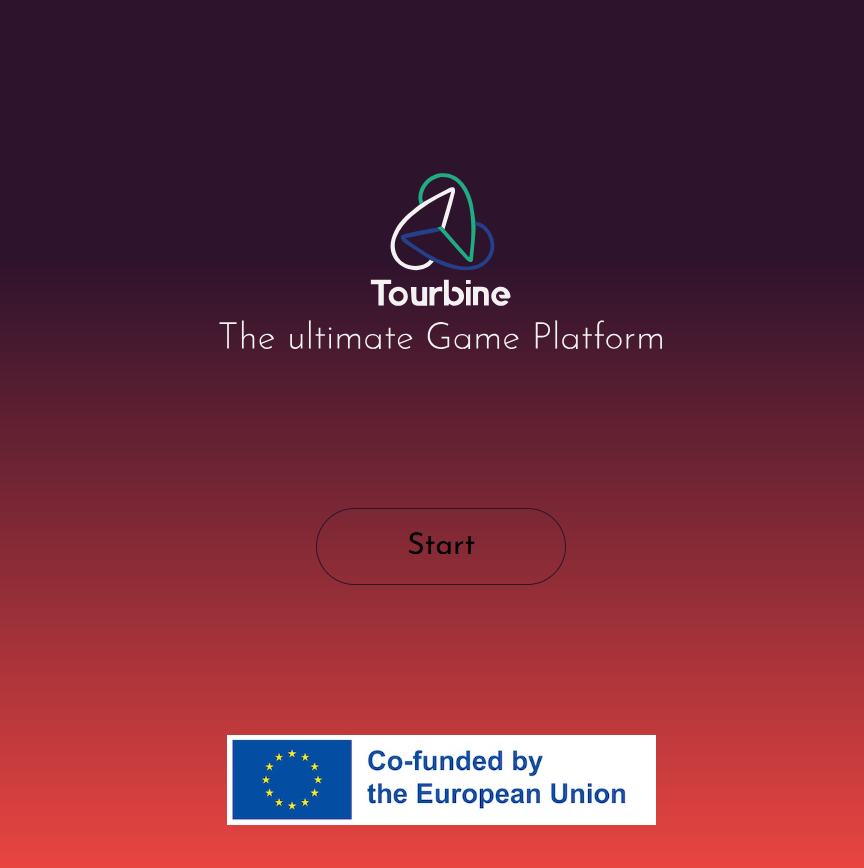
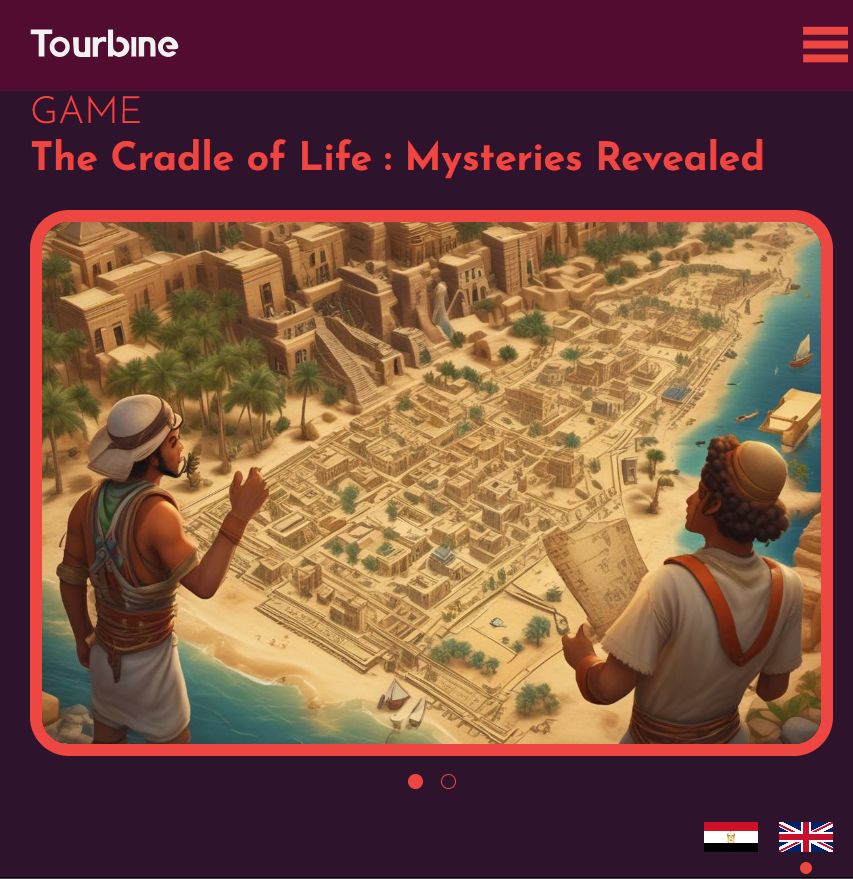
Why This Trial Matters
- Testing Engagement: The trial will assess how effectively the game captures and maintains players’ interest.
- Collecting Feedback: Participants’ feedback will play a vital role in refining gameplay mechanics and enhancing the user experience.
- Celebrating Heritage: This initiative highlights the potential of heritage-based tourism innovation and showcases the richness of cultural traditions.
This trial marks an exciting step toward realizing our vision of creating a unique and impactful tool for heritage education and tourism. Stay tuned as we bring history to life through gaming!
Tourbine Project at ITB Berlin: Empowering NEET Youth Worldwide
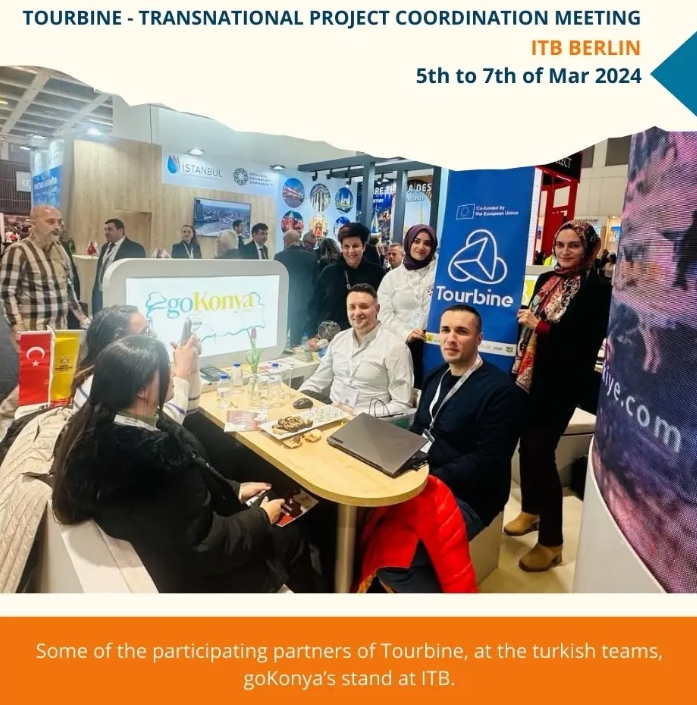
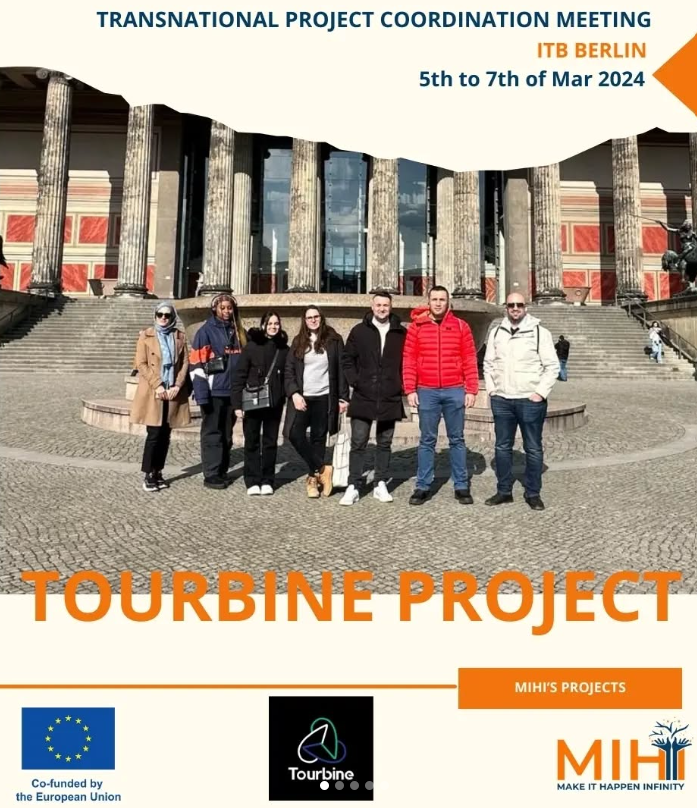
The Tourbine project recently hosted a Transnational Coordination Meeting in Berlin, uniting partners from Egypt, Turkey, the Netherlands, Greece, Bosnia and Herzegovina, Jordan, and Tunisia. Held during the prestigious ITB Berlin travel trade show, the meeting focused on promoting entrepreneurial mindsets and digital skills among NEET youth through innovative approaches in community-based tourism.
One of the event’s highlights was the presentation of the game “The Cradle of Life” to project teams and ITB attendees. This showcase provided an excellent opportunity to gather valuable feedback, which will be instrumental in refining the game’s development.
Why ITB Berlin Was Key:
- Visibility: The event offered a global stage to present the Tourbine project and its initiatives.
- Connections: It facilitated networking with industry professionals, enhancing collaboration opportunities.
- Empowerment: The project underscored its commitment to supporting youth with fewer opportunities by fostering their participation in tourism innovation.
Through this impactful event, the Tourbine project continues to advance its mission of empowering NEET youth and promoting sustainable tourism practices worldwide.
TOURBiNE: Empowering Youth Through Sustainable Tourism and Entrepreneurship
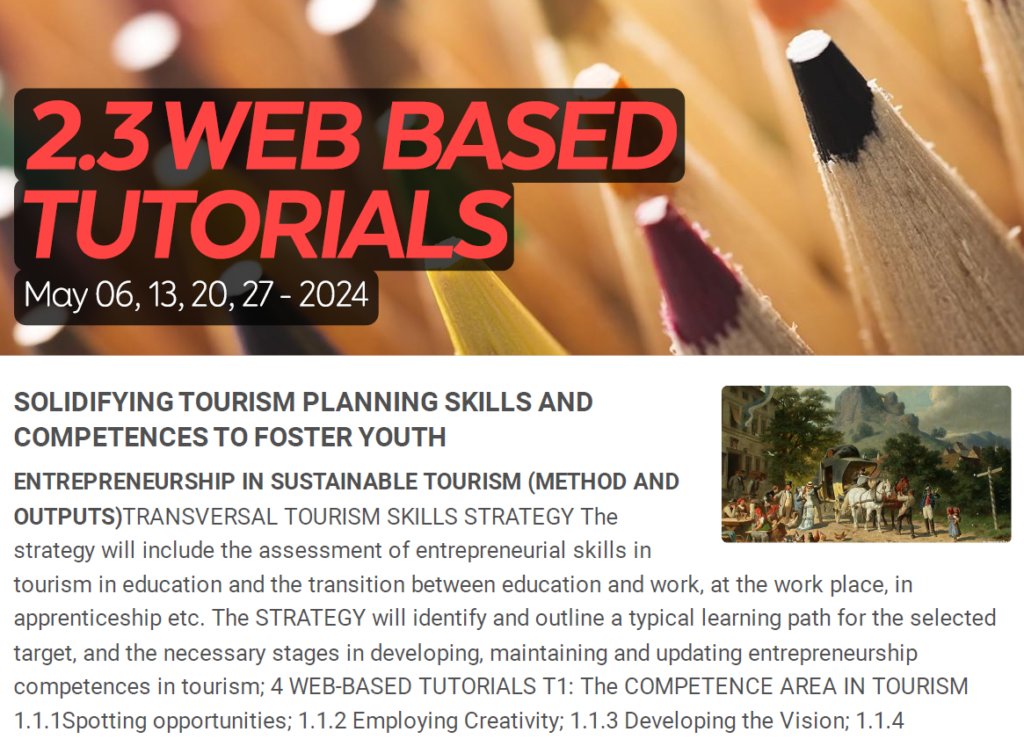
Overview
TOURBiNE offers a series of four web-based sessions aimed at enhancing youth entrepreneurship in tourism through sustainable tourism planning. Aligned with the European Entrepreneurship Competence Framework (ENTRECOMP), these sessions are designed to equip participants with the skills needed to design and evaluate sustainable tourism products and services.
Mentoring and Platform
The program begins with an introduction to tourism fundamentals, tools, and the collaborative platform MIRO, which will host all tutorials. Participants will gain insights into the history of tourism and industry essentials, providing a strong foundation for further learning.
Session Breakdown
- Session 1 & 2: Understanding tourism resources and exploring opportunities to create sustainable tourism products and services, drawing inspiration from European and international best practices.
- Session 3 & 4: Designing purpose-driven tourism products and evaluating services, aligned with ENTRECOMP to foster entrepreneurial skills.
Highlights and Collaboration
In July 2024, the TOURBiNE team participated in an online conference under the EATSA 2004 Germany framework, delivering a presentation on “Gamification in Tourism” led by Bassant Issa. This event showcased innovative strategies for integrating gamification into the tourism sector, enhancing engagement, and creating dynamic experiences for tourists.
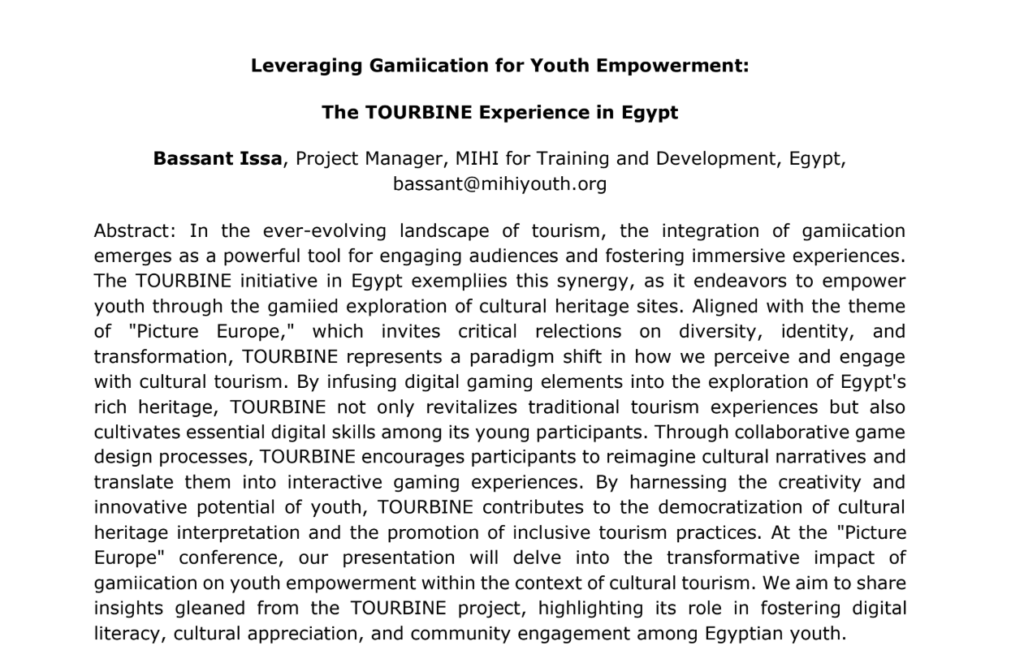
The conference emphasized collaboration, allowing attendees to participate in workshops organized by
Kevser and Dorothea, where ideas around European projects were explored in greater depth.
Meeting Recap: Presentation of Game Status in August
In August, our team convened to provide a comprehensive update on the status of our games, offering insights into progress, challenges, and next steps. The meeting served as a vital checkpoint for all stakeholders to evaluate the development process and discuss upcoming actions.
Key highlights of the meeting included:
- Progress on Game Development: We presented detailed updates on the design, mechanics, and direction of the games, highlighting advancements in gameplay features, user interface, and how earlier feedback had been incorporated.
- Challenges and Solutions: The team addressed various obstacles, such as technical difficulties and user experience adjustments, and brainstormed solutions to overcome these challenges effectively.
- Next Steps and Timeline: We outlined the upcoming stages of the project, focusing on refining the games, conducting additional testing, and finalizing elements like graphics and sound. A timeline was shared to ensure these tasks are completed in time for the next major milestone.
This meeting was crucial in maintaining clear communication and collaboration, helping to ensure the project remains on track and progresses smoothly.
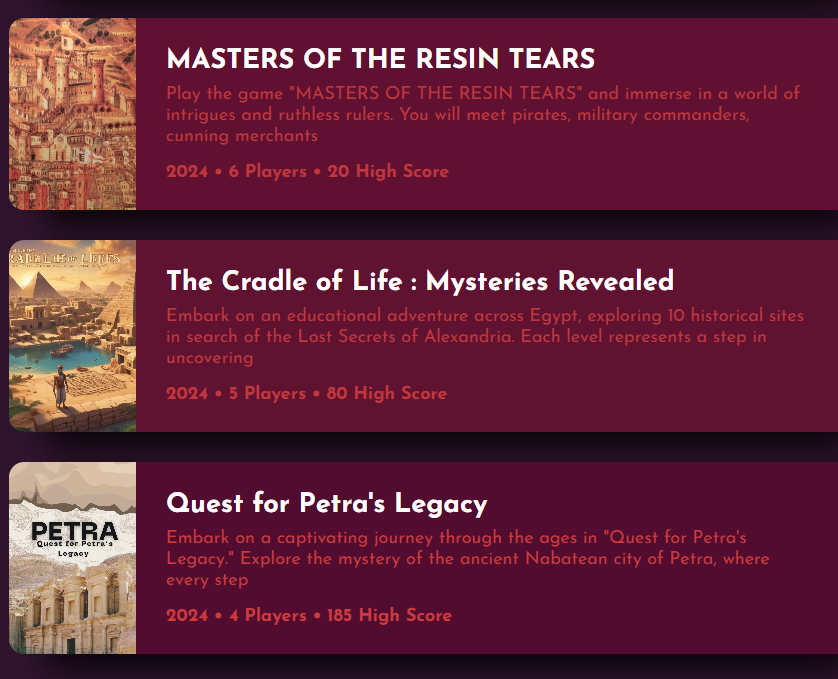
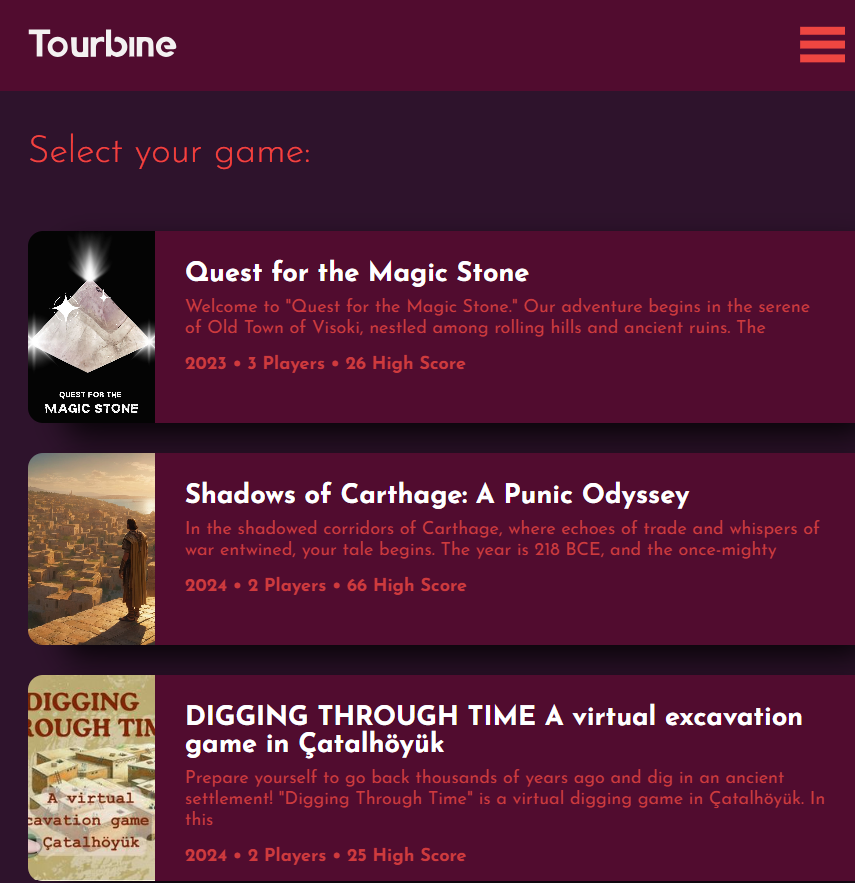
Game Development for TOURBiNE: Preparing for the Presentation in Alexandria
As the TOURBiNE project’s study visit in Alexandria (December 9-15, 2024) approached, the team worked diligently on developing educational games focused on sustainable tourism planning. These games were designed to support youth entrepreneurship in the tourism sector, aligning with the project’s goals of promoting sustainable tourism practices and entrepreneurial skills among young people.
Development Process:
- Educational Focus: The games aimed to teach players about sustainable tourism, resource management, and the creation of tourism products and services.
- Interactive Features: The games incorporated interactive elements to engage players in learning while also allowing them to explore real-world scenarios related to tourism planning.
- Collaborative Development: Project partners contributed their expertise to ensure the games were both educational and enjoyable, integrating international perspectives and experiences in sustainable tourism.
Preparation for the Study Visit and Presentation:
By December, the games were ready to be showcased at the study visit in Alexandria. This presentation provided an opportunity to highlight the outcomes of the development phase and gather valuable feedback from stakeholders, which would inform future improvements and refinements. During the evaluation workshops in Alexandria, the games were assessed for their effectiveness in engaging users and promoting the intended learning outcomes.
The presentation served as a pivotal moment in the project, offering a platform for discussing how these games can inspire youth in the field of sustainable tourism and entrepreneurship.
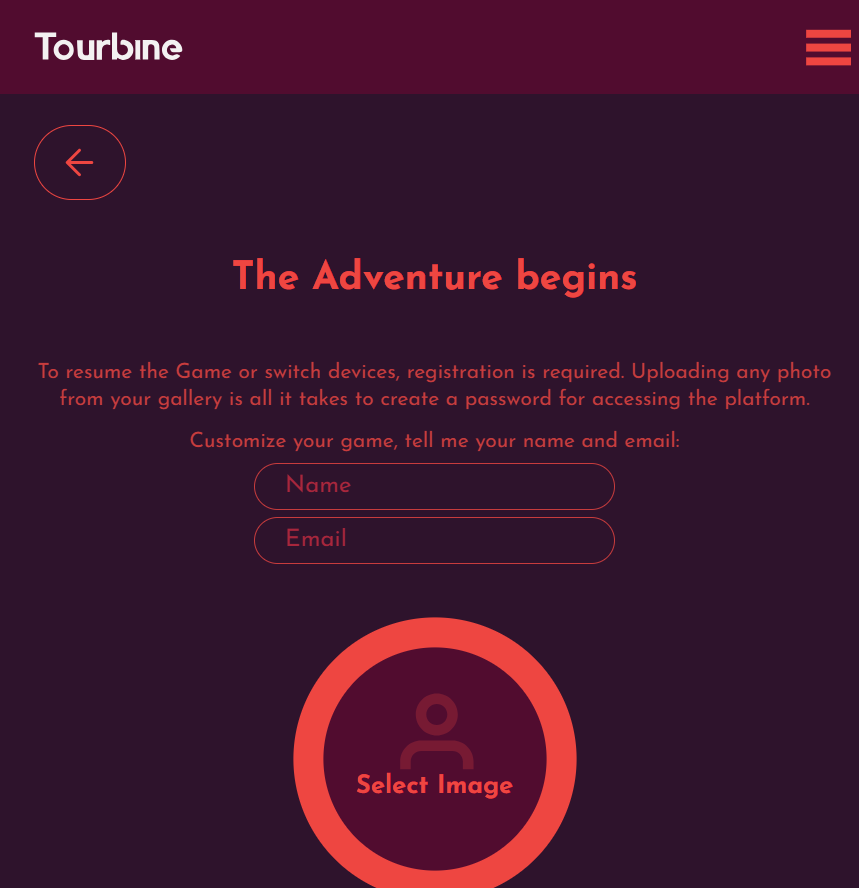
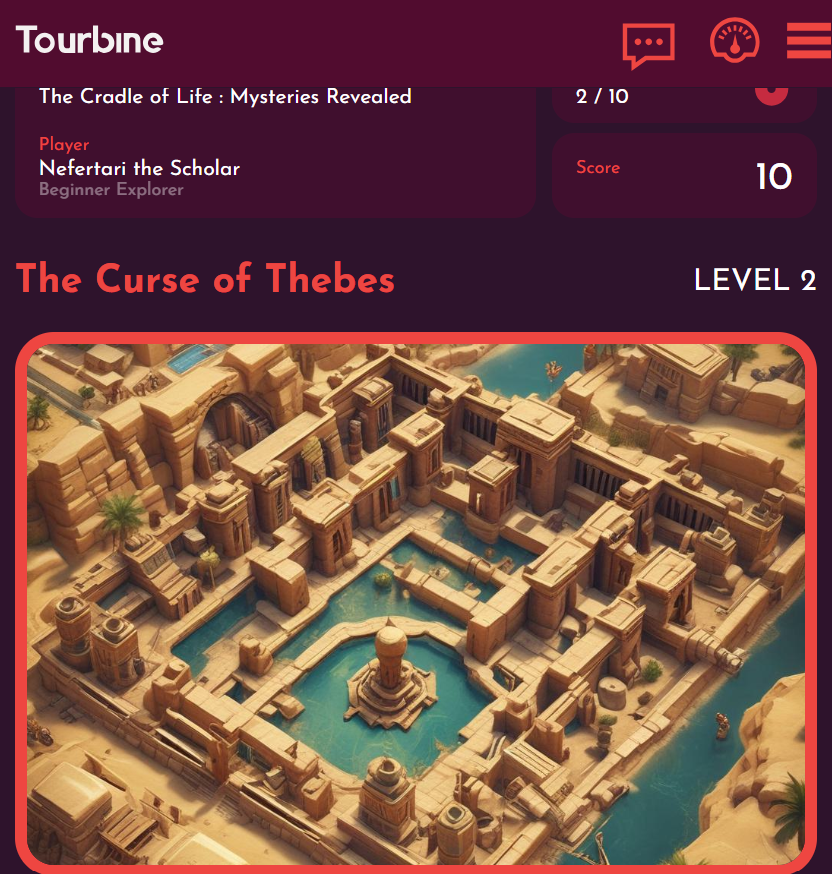

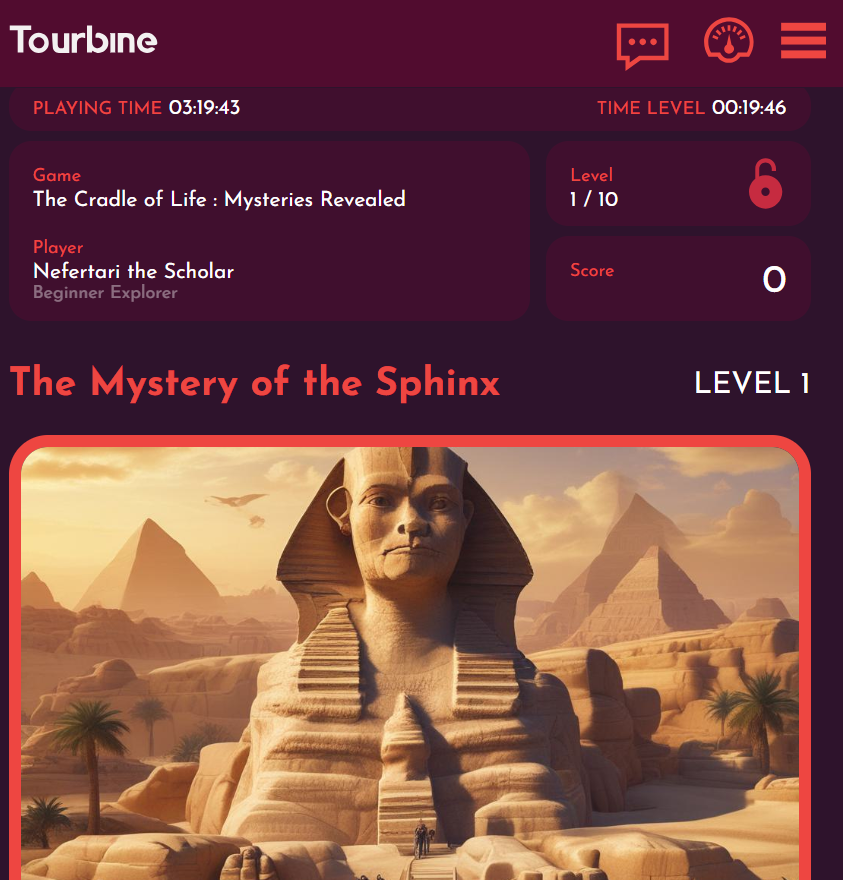
OURBiNE Study Visit and Evaluation Workshop (9-15 December 2024)
In December 2024, the TOURBiNE project team gathered for an enriching study visit and evaluation workshop in Alexandria, Egypt, from December 9th to 15th. The event was organized by MIHI for Training and Development.
Study Visits:
Participants visited key historical sites in Alexandria, including:
- Catacombs of Kom El Shuqqafa and Pompey’s Pillar (December 10th)
- Library of Alexandria (December 11th), featuring highlights such as the Main Reading Area, Antiquities Museum, and an optional Planetarium Show
- Qaitbay Citadel, Morsi Abu El Abbas Mosque, and the Roman Theater (December 12th)
These visits were designed to connect the project’s focus on sustainable tourism with Egypt’s rich historical and cultural heritage.
